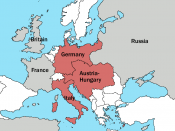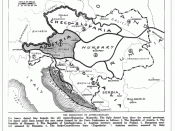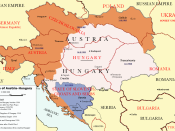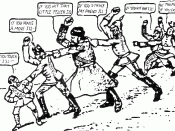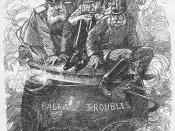How the European Alliance Helped Cause World War 1Historians have spent many years analyzing the origins of World War 1. Many factors are considered by historians when asked this question; nationalism, imperialism, militarism, etc. However all of these factors are influenced and tied together by the alliance system in place at the time tensions in the Balkans erupted. In this time period the Ottoman Empire had lost much of its control and power in the corridor to Europe. Many of the leading nations of Europe sought to emplace their influence in this region to serve as an economical attributor to its powerbase. With land being the primary means of travel between the East and West, having control of the corridor would be extremely favorable for any leading power to impose taxes, control the flow of goods, and serve as a barrier against future invaders.
Before 1914 the five Great Powers; Great Britain, France, Germany, Austria-Hungary and Russia controlled Europe.
In order to avoid conflict early on, the major powers went through great lengths to maintain a balance of power constructed from a complex network of political and military alliances throughout the continent. Germany was the chief orchestrator of these alliances when is first made a secret alliance with Austria-Hungary in 1879 (Duffy, "The Causes of World War One"). Three years later Italy joined this "Dual Alliance" to form the Triple Alliance because it was annoyed with France for stopping its plans to colonize North Africa. In 1870 Germany's industrial and economic power had grown greatly after the unification and the foundation of an empire built from the Old Prussian Empire. Tucker and Wheeler provide excellent details of how Chancellor Otto Von Bismarck, who successfully united Germany, carefully and tactfully, planned treaties with the other Great Powers. Strategically, for the sake the new German Empire, he sought to keep Russia close to his side in order to avoid a two-front war with France and Russia. In 1873 he successfully negotiated the League of the Three Emperors between Germany, Russia, and Austria-Hungary. This alliance failed however over the disagreement of the Balkan policy between Russia and Austria-Hungary forcing Germany into a secret alliance with Austria-Hungary over Russian influence in the Balkans. By aligning itself with Austria-Hungary, and later Italy, Germany believed it had successfully maneuvered itself to begin expanding its Empire.
By the late 1860s, Austrian ambitions in both Italy and Germany had been choked off by the rise of new national powers. With the decline and failed reforms of the Ottoman Empire in the Balkans, Slavic opposition in the occupied Balkans grew and both Russia and Austria-Hungary saw an opportunity to expand in this region to counter each others influence in the region. In 1876, Russia offered to partition the Balkans, but Count Gyula Andrassy declined because Austria-Hungary was already a "saturated" state and could not manage additional territories (Vitalis 76). This ended the League of the Three Emperors. In August of 1878 Austro-Hungarian forces occupied Bosnia and Herzegovina eventually annexing Bosnia and Herzegovina in October 1908. This infuriated the Pan-Slavic and thus pro-Serbian Romanov Dynasty who ruled Russia and the Kingdom of Serbia. Bosnia-Herzegovina contained a significant Slavic Serbian population Russia was very loyal to. Duffy and Strachan argue this occupation by Austria-Hungary forced Russian political maneuvering in the region destabilizing peace accords that were already fracturing in what has become known as "the Powder keg of Europe". In order to counter Russian and French interests in Europe, an alliance was concluded with Germany in October 1879 and with Italy in May 1882.
Italy's ideas for maintaining the balance of power in Europe clearly gravitated towards major alliances, even if they were a passive member. Its sole purpose for entering into the alliance of Germany and Austria-Hungary was to form a defensive alliance against France. Prior to joining, and thus forming the Triple Alliance in 1882, Italy and its newly unified government had sought to expand and colonize establishments in North Africa. The potential colony the Italians had sought was annexed by France in 1881. With the seizure of Tunisia by the French, Italy sought to counter the French by joining the alliance to bolster its muscle (Wheeler, "World War 1 Causes"). This was done to be able to maintain an influence under the pretext of protecting Italian citizens in Tunisia and control of what Italy saw was within their sphere of influence. Italian public opinion however remained unenthusiastic about their country's alignment with Austria-Hungary, a past enemy of Italian unification (Howard 6). There is some evidence that Germany and Austria-Hungary did not entirely trust their ally either. In a supplementary declaration to the formation of the Triple Alliance, Italy specified that its undertakings could not be regarded as being directed against the United Kingdom. This is believed to be widely accepted by historians because Italy needed to have an agreement with Britain about the Mediterranean. Britain needed access to the Mediterranean to gain access to its African and Indian colonies easily. Because Italy is surrounded by the Mediterranean, it could not afford to fall out with Britain due to its naval strength (Strachan 59). In any case, Italy was not a strong individual or military power Germany or Austria-Hungary could rely on.
After the onset of the Triple Alliance, the rest of the Great Powers became increasingly worried about its strength. Believing they could now be defeated by Germany, Austria and Italy acting together, France and Russia first agreed to help each other if attacked under the Franco-Russian Alliance in 1892. The Triple Alliance left Russia vulnerable, while France had been diplomatically isolated since its defeat in the 1870 Franco-Prussian War (Howard 23). Despite the political differences between France, a republic, and Russia, an absolute monarchy, relations between the two countries rapidly improved. This pact was to remain in effect as long as the Triple Alliance was considered a threat. The United Kingdom had maintained a policy of isolation on the European continent for nearly a century, intervening in continental affairs only when it was considered necessary to protect British interests and to maintain the continental balance of power (Tucker 4). However not wanting to be the only power with out allies Britain first begun dialogue with Germany, nearly entering the Triple Alliance up until King Edward the VII was crowned, broke off relations with Germany and signed the Entente-cordiale with France in 1904. The United Kingdom not entering into an alliance with Germany is believed by many historians to stem from English bitterness over the loss to the Germans in the Boer War in 1840. Finally in 1907 France brought all three nations together to form the Triple Entente when Russia and Britain entered into the Anglo-Russian Entente (Wheeler, "World War 1 Causes"). Mediated by the French, the Anglo-Russian Convention of 1907 brought an unstable British-Russian relationship together by settling a dispute the two powers shared over control of Central Asia; more notably Persia, Afghanistan, and Tibet.
The pinprick for World War 1 was the Balkans. The Balkans had been a problem for Europe for at least a century before. The many ethnic groups in the Ottoman Empire wanted to break away and form their own nation. To prevent war the Great Powers met and formed two more countries, Montenegro and Serbia, and gave Austria the control of Bosnia and Herzegovina. Serbia still wanted to form a new nation, Yugoslavia that would be comprised of Serbia, Montenegro and Bosnia (Etty 42). Austria opposed this due the amount of Russian influence in Serbia. In 1908 Austria made a political maneuver that would prove costly by deciding it wanted to own Bosnia-Herzegovina to prevent an invasion from Serbia, so they annexed it, making it part of their own empire. The Serbs and Russia were furious. For a time it seemed Russia would declare war on Austria, however Germany backed Austria, its good friend and ally. Russia knew that the German army was too strong for Russia's, so it did nothing. In 1912 the region became completely unstable when war broke out among the Balkan states as they quarreled over new boundaries gained from the final removal of the Ottoman Empire. The Great Powers were forced to intervene and settled the dispute. The Serbs were furious with the dispute because they did not get the land they wanted to form Yugoslavia. Tempers ran high in the Balkans and the only friendships that remained were the Alliances. Following the Ottomans withdraw completely from the Balkans, Pauli and Wheeler believe war was inevitable; all it was going to take was a little disturbance that would bring in the allies, who would call on their colonies creating a world war.
The trigger of WWI was the assassination of the Austrian Archduke Ferdinand. The heir to the throne was on his way to visit the capital of Bosnia, Sarajevo, with his wife. Etty and Pauli describe a young man of 19 belonging to a secret society known as Mlada Bosna (Young Bosnia) shooting the Archduke on their way to the station to return home. The investigation that followed implicated a number of members of the Serbian military, leaving Austria-Hungary and the Emperor of Austria determined to make Serbia pay. He presented Serbia with a series of ten demands to be met; Serbia met nine of the demands and part of the tenth. This list of demands became known as the July Ultimatum (Tucker 10). In the end Austria and Germany used this opportunity to invoke war on Serbia even though their pact was only for defense purposes. Serbia quickly gained the support of Russian help. The rest of the European Powers followed due to the Alliance system, and then the rest of the world followed due to imperialism. It is therefore reasonable to suggest the Alliance System was a significant cause of the war in Europe escalating into a world war. Although the immediate trigger of WWI was the assassination, the war would never have happened without the pre-war tension buildup and alliance system in place.
Works CitedWheeler, Heather. "World War 1 Causes" History on the Net Nov. 2000. Web. 6 Jan. 2010.
Duffy, Michael. "The Causes of World War One" The First World War Online 22 Aug. 2009. Web. 6 Jan. 2010.
Howard, Michael. "The First World War" New York: Oxford, 2002. Print.
Tucker, Spencer C., ed. "The Encyclopedia of World War 1" California: ABC-CLIO, 2005. 88-90. Web. 7 Jan. 2010.
Strachan, Hew, ed. "The Oxford Illustrated History of the First World War" New York: Oxford, 1998. Web. 8 Jan. 2010.
Vitalis, Robert. "The Noble American Science of Imperial Relations and Its Laws of Race Development" International Affairs (2008): Academic Search Complete. Web. 9 Jan. 2010.
Etty, John "Serbian Nationalism and the Great War" International Affairs (2009): 63-40. Academic Search Complete. Web. 11 Jan. 2010.
Pauli, Hertha Ernestine. "The Secret of Sarajevo; the Story of Franz Ferdinand and Sophie" Biography (1965): Electronic Books. Web. 11 Jan. 2008
